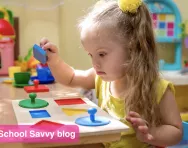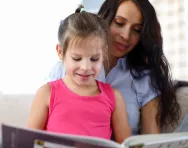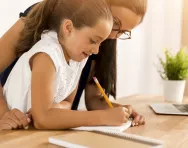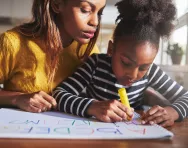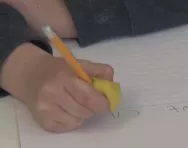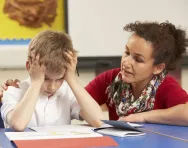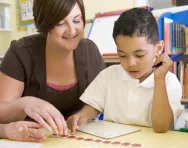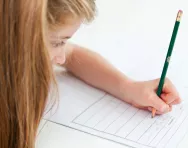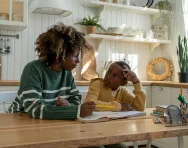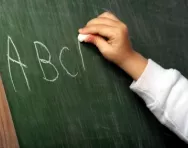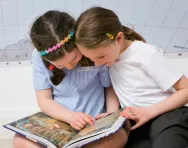Dyslexia articles
SEND funding crisis: Are children at risk?
SEND funding for schools is in a precarious state, leaving the future of education for SEND children uncertain. Primary headteacher Matt Revill shares his perspective on the alarming state of SEND education and offers actionable advice for parents looking to drive change.
17 helpful reading aids for dyslexic children
While dyslexic children have to overcome greater challenges to fall in love with books and become confident expressing themselves through the written word, there are lots of practical tips and aids to make the reading and writing process easier.
Reading and dyslexia: maintaining motivation
Your child has got the building blocks, the confidence and the motivation to become a confident reader. But how do you keep it all going? We’ve got some clever suggestions for you to help keep dyslexic children engaged and enjoying their valuable reading time.
Critical steps: empowering dyslexic readers
Dyslexic children can be discouraged from reading by their perceived lack of ability. How can you help them feel more confident and enjoy their reading time? We offer some useful tips for boosting confidence and thinking more positively.
Best literacy resources
Whether your child is just learning to read and print letters or looking for ways to put their creative writing skills to the test, we've rounded up some fantastic resources to help them practise phonics, grammar, story-writing and comic-creating at home. Plus there are loads of different ways to connect with authors and listen to stories.
6 useful study tips for children with Dyslexia, ADHD and DCD
Children with a specific learning difficulty (SpLD) such as dyslexia, ADHD and DCD/Dyspraxia, can find studying more of a challenge and often benefit from different styles of learning. Learning advisor and specialist teacher Ann-Marie McNicholas shares practical advice to help make studying easier.
The Welsh ALN Act explained
From September 2020, new provision for special educational needs will come into force in Wales. We explain the new ALN Act.
Best apps for children with special educational needs
If you're supporting a child with special educational needs, try these brilliant apps to help make life easier, at school and at home.
Handwriting in the National Curriculum
Handwriting may seem an outdated skill, but it’s still important in the primary school classroom. We take a look at what’s expected of our children.
The 6 Best touch typing tutors for kids
Touch typing is an essential skill for today's tech-savvy kids, offering them a huge advantage with secondary-school homework and for the whole of their working life, but your child is unlikely to be taught it in school. Using typing tools can hasten your child's progress while also learning techniques that can increase speed and accuracy.
We review 6 of the top typing tutor programmes to help you find the best at-home learning solution for your family
We review 6 of the top typing tutor programmes to help you find the best at-home learning solution for your family
18 reasons your child should learn touch-typing
Just 20 minutes of practice a day could be enough to make your child a fluent touch-typist in as little as 10 weeks. We explain why confident, fast typing skills are an essential skill for all primary school children.
Touch-typing is one of those skills that, along with shorthand, seemed to go out of fashion as women began to embrace careers beyond the secretarial. But while you might have a mental image of rows of well-groomed young ladies sitting behind their manual typewriters, touch-typing is far from an outdated practice. In fact, typing could be one of the most valuable skills your primary school child will ever learn.
Touch-typing is one of those skills that, along with shorthand, seemed to go out of fashion as women began to embrace careers beyond the secretarial. But while you might have a mental image of rows of well-groomed young ladies sitting behind their manual typewriters, touch-typing is far from an outdated practice. In fact, typing could be one of the most valuable skills your primary school child will ever learn.
How dyslexia affects writing
From formulating ideas to getting words on the page, we take a look at why written work can be a challenge for dyslexic children and suggest ways to support your child's writing at home.
How dyslexia affects spelling
Dyslexia can have a profound effect on how your child learns to spell, but there are strategies to help them tackle their challenges. We share advice from the British Dyslexia Association to help you help your child at home.
How dyslexia affects reading
From difficulty with phonics to ‘dancing’ letters, dyslexic children may face extra challenges when they're learning to read. We explain how you can support their learning at home.
What is a special school?
If your child has special educational needs, a mainstream education may not be right for them. We take a look at how special schools could help.
Handwriting aids: pencil grips
Does your child struggle to hold their pencil correctly? Handwriting tutor Michelle van Rooyen explains how a pencil grip could help with their handwriting.
Handwriting aids: pens and pencils
With a return to greater emphasis on handwriting in primary schools, could a special pen or pencil help your child master the art of neat writing? Handwriting tutor Michelle van Rooyen explains what handwriting pencils and pens are available.
"She has had to work two or three times harder than her peers"
Helen Barylo from Coventry describes her experience of the SEN and school system with her son Aurora, 16, who is dyslexic, and shares her tips for other parents.
How to work with your child’s SENCO
Having a healthy working relationship with your child’s SENCO can help ensure they get the support they need. Here’s how to ensure you make a good team. By Lucy Dimbylow
How a SENCO could help your child
If your child has a special educational need, the school’s SENCO is likely to play a big part in his day-to-day life and learning. Lucy Dimbylow highlights nine ways in which she can help make your child’s school journey easier.
7 common dyslexia questions answered
If your child is dyslexic you'll want to help them get the support they need at school and at home. Dr John Rack, Head of Research, Development and Policy at Dyslexia Action, answers common questions about dyslexia identification, homework and tutoring and suggests sources of further information and advice to help you help your child.
Education, health and care plans (EHCP): expert tips to help parents
Statements of special educational needs have recently been replaced by EHCPs. SEN experts Antonia Chitty and Tania Tirraoro explain how the new plans work and share their tips on the application process
Homework tips for children with dyslexia
The British Dyslexia Association shares tips to help make doing homework a calm and productive process for your dyslexic child.
Settling a child with SEN back into school
After the school holidays any child can find it unsettling heading back to school but it can be especially worrying for children with SEN. Here’s what you can do to help.
How dyslexia is identified
You think your child may be dyslexic, but how can you really be sure when they’re still quite young? Teacher and parent coach Glynis Kozma gives a few pointers for early identification.
Boosting your child's concentration skills
Your guide to the special needs that can cause concentration difficulties and tips to help your child focus.
Does your child have special educational needs?
Find out about the wide spectrum of special educational needs children can have – and how you can support them at home and get the support they need in school.
How educational psychologists can support SEN children
What is an educational psychologist and how might they help your child? We chat to consultant child educational psychologist Laverne Antrobus to find out.
How can a clinical psychologist help your child with SEN?
Clinical psychologist Elizabeth Kilbey chats to TheSchoolRun about what her job involves and how a clinical psychologist can support a child with special educational needs.
Explaining special needs to children
Amy Schofield speaks to SEN expert Vicki Dawson to find out how to approach the subject with your child.
Dyslexia: strengths, advantages and opportunities
While dyslexic children can have learning difficulties they can also be very gifted in certain areas. Find out how to create a positive and constructive learning experience for your dyslexic child with our top advice.
Getting the right support for children with dyslexia
Your guide to the signs of dyslexia and step-by-step advice on how to get your child the appropriate educational support.
8 dyslexia signs you should never ignore
Concerned about your child's progress at school? Familiarise yourself with the signs of dyslexia so you can get help for your child if they need it.
How does dyslexia impact on a child's learning?
We look at how dyslexia can affect your child at school and strategies to use at home to support their learning.
Top tips to help your dyslexic child enjoy reading
Reading might be difficult for some dyslexic children, but that doesn’t mean they can’t enjoy it. We have tips to help you inspire them to love books.
How technology can boost dyslexic children's learning
Mind mapping is a great way for dyslexic children to learn and using computer software to do it makes it even easier. Read on to find out more.
Making sense of the SEN Code of Practice
Your guide to some of the key procedures and recommended actions in the SEN Code of Practice. Plus find tips on supporting your child.
